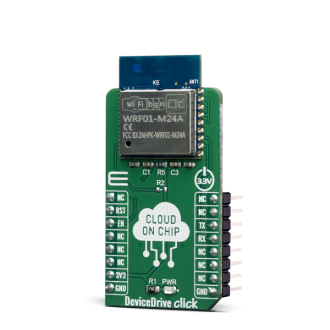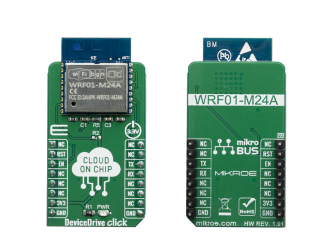
We strongly encourage users to use Package manager for sharing their code on Libstock website, because it boosts your efficiency and leaves the end user with no room for error. [more info]

Rating:
Author: MIKROE
Last Updated: 2019-07-18
Package Version: 1.0.0.0
mikroSDK Library: 1.0.0.0
Category: WIFI
Downloaded: 2633 times
Not followed.
License: MIT license
DeviceDrive Click is a complete Cloud-on-Module solution with Wi-Fi functionality and integrated PCB antenna.
Do you want to subscribe in order to receive notifications regarding "DeviceDrive click" changes.
Do you want to unsubscribe in order to stop receiving notifications regarding "DeviceDrive click" changes.
Do you want to report abuse regarding "DeviceDrive click".


Library Description
This library allows user to perform a control of the DeviceDrive click and communication between device and cloud. User has options to send commands, configurations, messages, files... Every response from the WRF01 module will be sent to the user via handler function in JSON format. On this way every response on the sent command, every indication, connection status of the local network, device status can be checked and processed by the user. This library has also some necessary and important commands to perform network connection, module configuration and messages sending. For more details check full documentation.
Key functions:
void dd_uartDriverInit( T_DD_P gpioObj, T_DD_P uartObj ) - This function initializes UART serial interface.void dd_send_cmd( char *cmd_string ) - This function allows user to send a command to the module.T_DD_RETVAL dd_process( void ) - This function performs a response processing.void dd_setup( const char *param_code, const char *param_value ) - This command allows user to send setup commands to the WRF01.Examples description
The application is composed of three sections :
void applicationTask()
{
rx_cmd = UART_Rdy_Ptr();
if (rx_cmd != _DD_RSP_NOT_READY)
{
rx_cmd = UART_Rd_Ptr();
switch (rx_cmd)
{
case '1' :
{
mikrobus_logWrite( "> send message 1:", _LOG_LINE );
Delay_ms( 500 );
dd_send_cmd( &message_1[0] );
break;
}
case '2' :
{
mikrobus_logWrite( "> send message 2:", _LOG_LINE );
Delay_ms( 500 );
dd_send_cmd( &message_2[0] );
break;
}
case 't' :
{
mikrobus_logWrite( "> get time:", _LOG_LINE );
Delay_ms( 500 );
dd_get_time();
break;
}
case 'u' :
{
mikrobus_logWrite( "> check upgrade:", _LOG_LINE );
Delay_ms( 500 );
dd_check_upgrade();
break;
}
case 'f' :
{
mikrobus_logWrite( "> factory reset:", _LOG_LINE );
Delay_ms( 500 );
dd_factory_reset();
break;
}
case 'c' :
{
mikrobus_logWrite( "> connect to network:", _LOG_LINE );
Delay_ms( 500 );
dd_set_product_key( &product_key[0] );
processResponse( 1000 );
dd_connect( &network_name[0], &network_pwd[0] );
break;
}
case 'i' :
{
mikrobus_logWrite( "> introspect:", _LOG_LINE );
Delay_ms( 500 );
dd_send_cmd( &introspect_cmd[0] );
break;
}
case 'v' :
{
mikrobus_logWrite( "> turn on AP:", _LOG_LINE );
Delay_ms( 500 );
dd_show_device( &ap_on[0] );
break;
}
case 'l' :
{
mikrobus_logWrite( "> enable debug/error logging:", _LOG_LINE );
Delay_ms( 500 );
dd_setup( &debug_mode[0], &set_all[0] );
processResponse( 1000 );
dd_setup( &error_mode[0], &set_all[0] );
break;
}
case 's' :
{
mikrobus_logWrite( "> status:", _LOG_LINE );
Delay_ms( 500 );
dd_status();
break;
}
default :
{
mikrobus_logWrite( "> invalid command", _LOG_LINE );
Delay_ms( 500 );
logCmd();
break;
}
}
}
processResponse( 1 );
}
Additional Functions :
Other mikroE Libraries used in the example:
Depending on the development board you are using, you may need USB UART click, USB UART 2 click or RS232 click to connect to your PC, for development systems with no UART to USB interface available on the board. The terminal available in all MikroElektronika compilers, or any other terminal application of your choice, can be used to read the message.